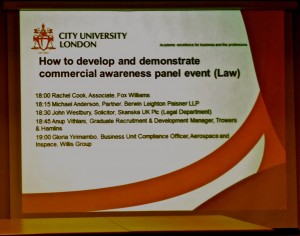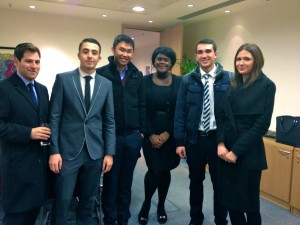How to develop and demonstrate commercial awareness…AND still prove you are well-rounded – Michael Kokkinoftas

On the 21st February, City University students were fortunate to welcome five speakers from different sectors of the legal world, that not only shared their commercial knowledge, but vital tips to stand out as future lawyers. Privileged with the opportunity to interview one of the speakers, Michael Anderson offered a generous insight into his routine at Berwin Leighton Paisner, which is a respected institution that was awarded the title of “Firm of the Year” at the British Legal Awards in 2010.
Mr Anderson began by explaining his route to his current role at BLP, how 1989 saw him as a trainee working his way up the legal ladder and by 1991 he was a qualified solicitor. By the millennium he had already received partnership at BLP. His main tasks comprise of “juggling transactions whilst gravitating towards certain clients and at the same time investing in looking after them.”
His specialism consists mainly of Mergers & Acquisitions, Outsourcing and Healthcare and he progressed through his career by undertaking equities and joint ventures, as well as joining the Corporate Finance division. But this is all material you could probably discover surfing BLP’s website or even by visiting a Mergers & Acquisition Workshop (exactly what us City Law students did on the 13th February!). So cutting to the chase, what myself and definitely all us Lawbore followers were really eager to find out was resolved in the following question:
“Knowing what will make us “Commercially Aware” is a little like the Holy Grail for us law students; can you give us your top tips?”
– First and foremost, comprehend your client’s chief priorities.
– Secondly, understand the journey they want to embark on.
– So when giving them advise, apply the realism of the economic market.
– Understand the commercial qualities of any deal so you’re not just applying rigid law to the agreement.
– Consequently, there must be an understanding in relation to the concerns and the priorities of any business. This needs to be highlighted to the clients so that businesses can have the ability to thrive.
– “Overall, you’ve undertaken this job to get your client across the finish line. So learn to listen. Listen at university, listen to your peers and your lecturers and listen to what your client is seeking. Always have your ears open.”
We are now aware of how Michael Anderson understands and applies commercial awareness when he is providing legal help to his clients. It was obvious through out the interview that he genuinely enjoys growing with his clients; investing in new upcoming recruitment and overall helping businesses succeed! However in my opinion, I believe the students that attended this evening, especially those who had attempted gaining or had even succeeded in obtaining some legal work experience, wanted a subjective understanding of what graduate recruitment search for when they are reviewing 1000’s of applications. We want to know: What will make us stand out? How do we prove that we are commercially aware without re-wording the Financial Times?
This is when Graduate Recruitment & Development Manager of Trowers & Hamlin, Anup Vithlani made a remarkable appearance. The evening commenced with a speech and a presentation with the ability to transform and put his self in the shoes of us undergraduates. When talking he was succinct and he was sharp, demanding the audience’s complete attention.
“Work Hard, Play Hard, Be Real.”
– Demonstrate the commerciality and knowledge that you have obtained wherever you have worked. For example, if you work at Tesco’s focus on the wider perspective of the company such as the political, social and economical factors of this establishment.
– Be aware of what is going on in the world. (You will never be Einstein just because you read the Financial Times.)
– Think outside the box – be a lateral thinker.
– Be eloquent and well structured when answering application questions. (He suggested that you spend at least 8 hours on one application.)
– Demonstrate your understanding of the firm. (Some food for thought is asking yourself: Why a commercial solicitor as opposed to any other sector? How has the firm developed? Who are their top 5 clients? Any major cases that they have dealt with and what their influence was in these cases – How and why is that important? )
– Have a life! (Much easier said than done!)
– Trowers & Hamlins are looking for human individuals with a broad range of experiences. Academic Geeks are not welcome, so stand out from the crowd.

Rachel Cook – Associate, Business Law Firm, Fox Williams
Mrs Cook instigated her speech by explaining her perception of commercial awareness and the importance of this concept, as it “should become a second nature for any aspiring or working lawyer”. This doesn’t mean reading the Financial Times, but something that will summarize the daily news, which will prove profitable when one is at an interview stage.
Don’t try to cram what’s happening in the business world a night before your interview, but take into account what is going on in the world bit by bit. In this economic period, where more and more people are going after fewer jobs there is one question on our minds: How else can we stand out?
“It’s not what you write in your application, but the reasons that you are giving for what you are saying. Your answers should be relevant to the industry that you have applied to. When being interviewed, your employer will most likely see through any fabricated stories and realise how genuine someone actually is.”
Similar to Michael Anderson’s presentation, Mrs Cook also described the importance of marketing new clients, dealing with the fashion industry she explained the need to be “fashionably aware” and up to date in terms of exposure. This will raise Fox’s team profile and assists in a business development as lawyers should always be looking to promote and develop their law firm by retaining clients and increasing profits and turnover. Overall, enjoy what you do.
John Westbury, Solicitor, Skanska UK Plc (Legal Department)
In contrast, Mr Westbury depicted an anecdote in order to define what commerciality means to him. His anecdote was one that the audience empathised, describing his own legal mistakes as a young lawyer. He clarified the realism of the corporate world when dealing with clients and opened some of our eyes by explaining;, “When you are in the real world everyone takes in different types of information, sometimes it is difficult for various clients to understand the legal information and detail that you are explaining to them. One client may even think that you are showing off or boasting.” This will lead nowhere but a dead end and an empty wallet.
The lessons learnt from Mr Westbury’s story were:
– Prove commercial empathy with your client. Brainstorm and explain what is really needed as what a client thinks they need may sometimes be of little relevance.
– Clients expect different things from different situations. Look at the big picture and apply common sense first before focusing on minor detail.
– Each client is individual. Clients aren’t lawyers, or lecturers and are not impressed by quotes or judgments written by Lord Denning. Sometimes without an appreciation and understanding of the real world, the knowledge of the legal world may not be enough.
– Therefore be absolute; direct your client on the risks with sharp strong advice. “Manage expectations and be realistic.”
Gloria Yirimambo a Business Compliance Officer at Willis Group took to the stage with some of her guidelines on how to demonstrate commercial awareness. In a nutshell she explained that “having an understanding of a company and the law it operates” is a core definition of what commerciality stands for. Providing the audience with interview support, she highlighted the importance to know the background of the firm and industry that you have applied to; defining how vital it is to draw upon your knowledge. You have more awareness and experience than what you think. But the last thing you want to do at an interview is tell your interviewer that you have commercial awareness.
– So sell yourself where you must!
– Think about development the institution is searching for and if it is on an international level and appreciate the long-term and short-term implications.
– Take time to understand what the company does and stands for.
– Respect makes you a better well-rounded person.
– To be better well rounded one must experience as much as possible.
– Look at the firms website and then compare it to their competitors. Think of the weaknesses, strengths and threats.
– Gain as much experience as possible – work experience, internships and placements all prove awareness.
– Provide situations where you have been dedicated and ambitious in order to achieve an end-result.
“Overall make the most of all opportunities as knowledge is power, and experience is most essential in getting ahead.” The evening came to an end and we left with some valuable knowledge and top tips on commerciality and just what recruitment are searching for in a future employee.
Thanks to Michael, LLB2 student at The City Law School.
